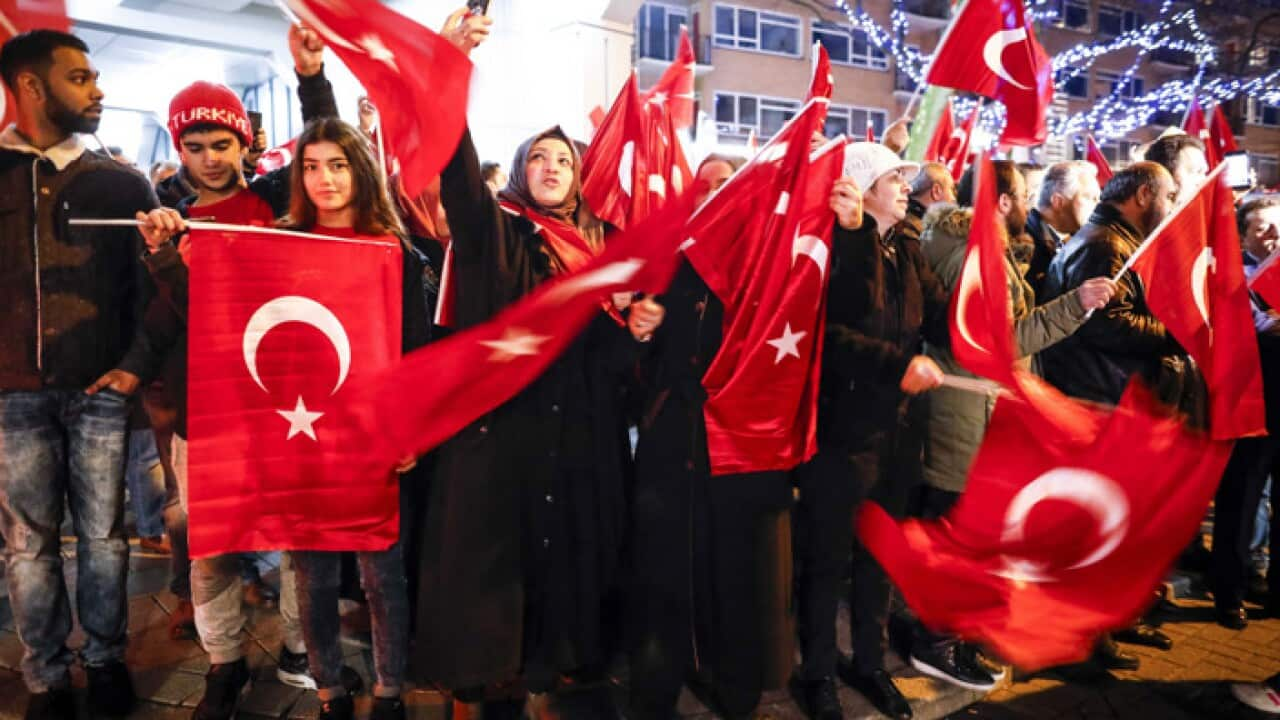Campaigning was reaching fever-pitch on Sunday, three days before key Dutch elections in the far-right is poised to make huge gains, but the poll has now been overshadowed by a bitter diplomatic row with Turkey.
As politicians crisscrossed the country ahead of Wednesday's vote, Turkish and Dutch leaders traded barbs after The Netherlands banned Turkish ministers from a pro-Ankara rally in Rotterdam.
The Turkish President branded the Netherlands "Nazi remnants" after the ban while images of protesters waving Turkish flags and clashing with riot-police led the news across the country.
Dr Stijn van Kessel, a Dutch political lecturer at Loughborough University has been watching the rise of European populist parties closely.
"This will have an impact on the campaign as it's a very prominent issue in the news now," he told SBS News.
Dr van Kessel says the issue has the potential to benefit anti-Islam Party for Freedom leader Geert Wilders, as well as the Christian Democratic Appeal (CDA) - both parties have used the flare-up to argue that cultural integration has failed.
While the CDA has seen a lift in support, support for Wilders' PVV has plummeted in recent weeks - down from December highs during a trial in which he was found guilty of inciting racial hatred against Moroccan immigrants. Prime Minister Mark Rutte's VVD party, leading in the polls but expected to lose as many as 17 seats, has also taken a firm approach against Turkey's admonishments.
Prime Minister Mark Rutte's VVD party, leading in the polls but expected to lose as many as 17 seats, has also taken a firm approach against Turkey's admonishments.

The most recent "Peilingwijzer" poll aggregation showing trends over the last 12 months among the larger parties. Source: Peilingwijzer
"Critics argue that [Rutte’s] government would not have acted so tough if it wasn't for the upcoming election and the fear of Wilders' electoral competition," Dr van Kessel said.
He expects Mr Rutte to refer to his strong stance in an upcoming TV debate with Mr Wilders.
For Mr Rutte, who is bidding for a third term as prime minister, the stakes are high.
The VVD is expected to net between 23 to 27 seats - well down from 40 MPs in the outgoing lower chamber.
Although Mr Rutte has maintained a narrow lead in recent polls, he's been second place to Mr Wilders for most of the past 18 months.
"I'm fighting very hard to win these elections," Mr Rutte told reporters as he campaigned in The Hague on Sunday. "Now we are ahead in the polls, but still I think we should gain some more seats."
But he warned "it is still possible that Geert Wilders could win the elections" pointing to last year's shock Brexit vote and the victory of Donald Trump in the US presidential race.
"I am not personally afraid, (but) I think it is not a good outcome to the election," he said.
Buoyed for months by the polarising debate over immigration, Mr Wilders sought to capitalise on violent scenes in Rotterdam early Sunday when riot police moved into break-up a huge demonstration.
Tweeting a picture of a woman in headscarf taking a selfie amid a sea of Turkish flags, he wrote: "Decades of open borders, mass immigration, no integration, and double nationality and this is the result."
'Cultural divide'
After weeks of flirting at the top of the polls, Mr Wilders has seen his ratings slip and may now come second with between 19 and 23 seats, according to the latest surveys.
The election is being closely watched as a bellwether of the ahead of other national votes in Europe later this year.
Known for his incendiary anti-Islam rhetoric, the peroxide-blonde Mr Wilders has vowed to close the country's borders to Muslim immigrants, ban the Koran and shut mosques.
If he emerges as one of the largest parties in parliament he may be a difficult voice to ignore.
Recommended:

Who's who in Dutch politics
Already Mr Rutte, in a bid to sap support from Mr Wilders, has called on immigrants to .
The row with Turkey, "emphasises this cultural divide, the cultural issues in the elections," said analyst Monika Sie Dhian Ho, director of the Clingendael Institute think-tank.
"It forces the more established parties to also run a campaign in this cultural dimension, rather than in the traditional left-right dimension," she told AFP.
Wednesday's results will likely trigger some tough coalition talks to govern one of the largest countries in the eurozone and a founding pillar of the European Union.
Why the Netherlands is bracing for political disruption:
Rise of the greens
Polls also suggest the Christian Democratic Appeal (CDA) and the progressive pro-democracy party D66 - both long-established parties - are having a late surge and may take between 18 and 20 seats each.
With a total of 28 parties chasing some 12.9 million eligible voters, the results are likely to be fragmented and negotiations to form the next coalition government could take months.
Many parties have vowed not to work with Wilders, and these elections have also seen the remarkable rise of the left-wing ecologists GroenLinks and their charismatic young leader Jesse Klaver.
"My weapons are hope and optimism," the 30-year-old Klaver told AFP Saturday after campaigning in southern Eindhoven.
"We have a realistic view for the future, these are our weapons... we don’t have a normal campaign. We are building a movement that is stronger than any parties in Netherlands."
Several of the party leaders are already eyeing the coveted premiership, such as the leader of the progressive D66 party Alexander Pechtold.
"I think there should be an alternative to Mr Rutte, and it should be a progressive alternative," he told AFP.















